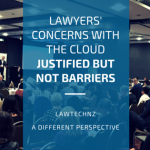Lawyers’ concerns with the cloud justified but not barriers – LawTechNZ, a different perspective.

Last month Simon and I attended the LawTechNZ conference organised by e-Discovery. LawTechNZ is a platform to educate, showcase and encourage greater adoption of technology by lawyers and their firms. We attended as exhibitors, so instead of the usual summary on the sessions, which you can find here, we thought to provide an overview from a different angle.
Over the course of the day we meet with lawyers open to embracing new technology and who are looking for the best ways to innovate in their firms. This gave us an opportunity to learn more about the questions and concerns of law firms today when it comes to cloud IT.
Key concerns are security…
According to a recent Australian survey of law firms conducted by InfoTrack, over 46% said ‘data-privacy’ was the primary reason they were resistant to the cloud. We found a similar theme with those we meet at LawTechNZ.
Entrusting someone else outside of the firm with their data is a challenging step for some. For example, “how will I know my data will be safe with you?” was a question that popped up several times with delegates we met with. Also, not having their data within arm’s reach where they can see and touch it made some feel uneasy – “Is [my data] safer in the cloud than being in my office?”
The answer is in your provider – not all cloud-centric IT service providers are created equal, and when it comes to security you need to be able to trust who you’re working with.
With Resolve, the answer is yes, you’re data is safer outside your office and in our ‘cloud’. Not only because our in-depth security systems and multi-level access protocols couldn’t be easily achieved by one small to medium law firm, but because it’s what we do.
…and hidden costs
It was also apparent from our discussions with lawyers at the conference that hidden costs made them reluctant to adopt the cloud.
It’s often touted that it’s cheaper to be in the cloud than use in-house IT, but some think it’s too good to be true – and they’re right – in some cases.
It can be cheaper if your cloud provider is storing your data and mail offshore, the further offshore, generally the cheaper it gets. Office365, Amazon, Google for example can charge low data storage and software usage rates because they have high volume and utilise low cost data centres in other parts of the world. But you do miss out enough from these cheaper services that you need to have either in-house IT or outsourced support, and then trust becomes another issue.
From our point of view the cost benefit is in the cost model not the price itself. There are a list of benefits to go from a cyclic capital expenditure model to a reoccurring operational expenditure model, and what we hear from our clients is that it makes a real difference to resources usually tied up in replacing hardware. Check out this article by Simon Falconer in LawTalk, which provides some transparency to cloud pricing.
But what about data sovereignty?
In the same survey by InfoTrack, more than 56% of respondents said “data sovereignty” was their primary concern with cloud services.
However, at the conference, and what we’ve noticed with potential customers, is that data sovereignty isn’t high on the list of wants and needs.
But, I think it should be.
In a nutshell when your data’s stored offshore, you have to keep an eye on laws changes in that country around privacy or your rights if the service you’re using ceases to exist. There may also be different rules in the country where your data is held, which means it can be accessed without your permission or knowledge. This is concerning to say the least.
And if all your data resides in New Zealand, it doesn’t necessarily mean you are protected by New Zealand law. It depends on who owns the data centre. Subsidiaries of US-owned corporations are subject to US laws meaning that data stored in a New Zealand data centre, which is ultimately owned by a US corporation, is equivalent to data residing in a US-based data centre.
So it comes back to the question, “how will I know my data will be safe with you?” Well, Resolve can tick the data sovereignty box. Although we don’t own the three data centres we use, they are owned by three different New Zealand owned companies – so our eggs are in different baskets.
What we do own, and are responsible for, is all the hardware that our customers access everyday to run their businesses. This means our ‘cloud’ is isolated from everything else within the data centre, and of course we’re a New Zealand owned and operated company, so only New Zealand laws and regulation applies to all of our customers’ data.
Although we can answer the main concerns that these forward thinking lawyers at LawTechNZ have, their concerns are justified. These concerns however can often be a barrier to making the transition to the cloud. Lawyers can be slow to move on technology that will improve efficiencies and reduce risks, and that’s why a conference that brings technology and lawyers together is so valuable.
Nick Phillips, Operations Manager, Resolve Technology
